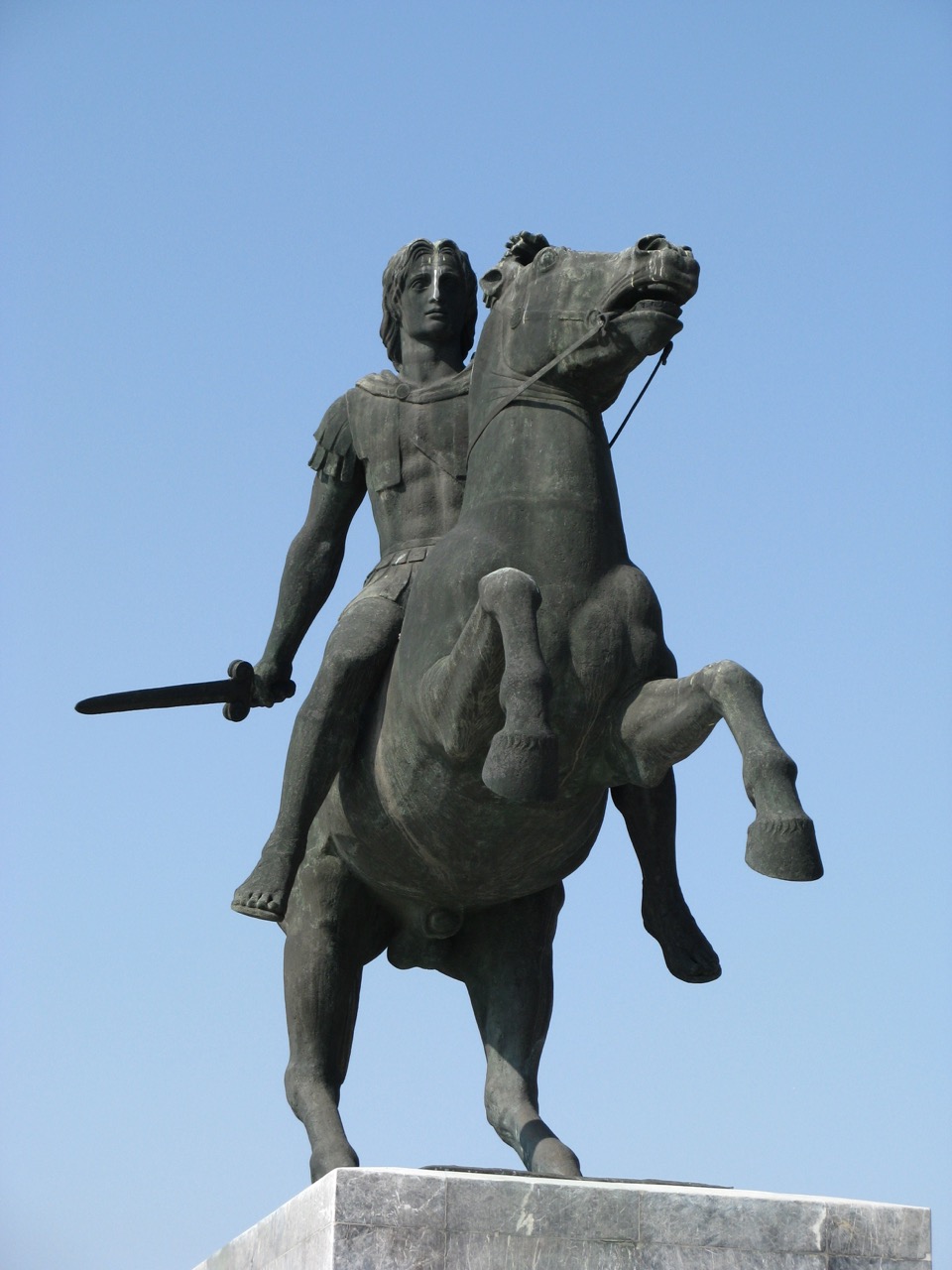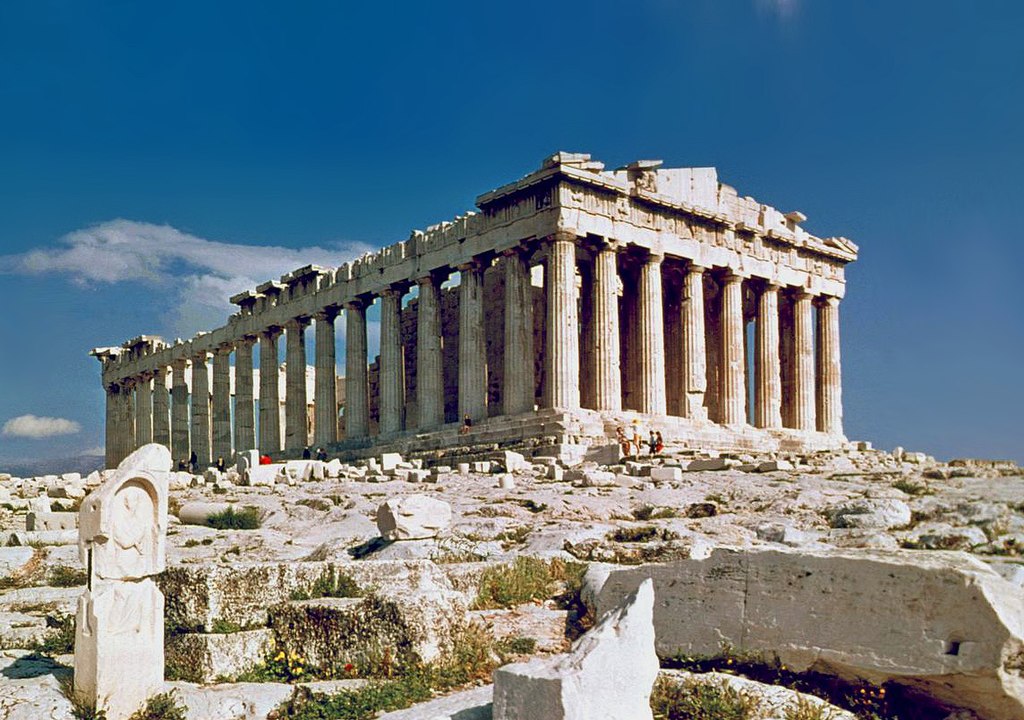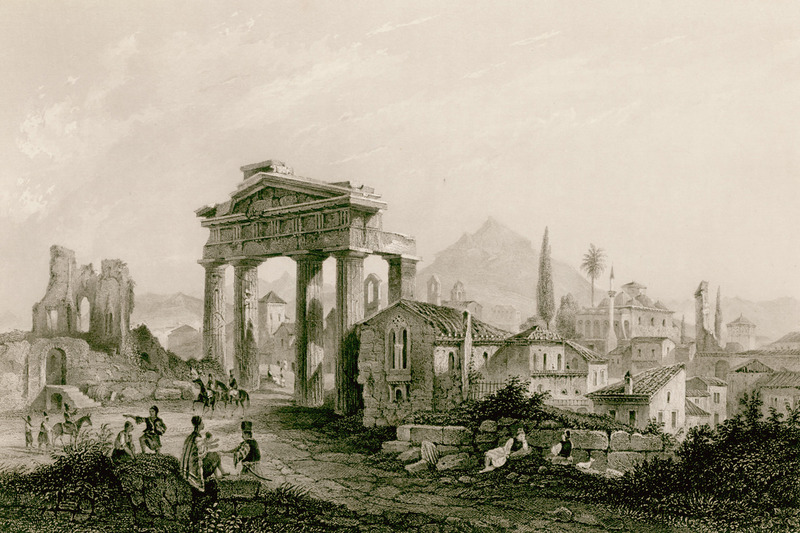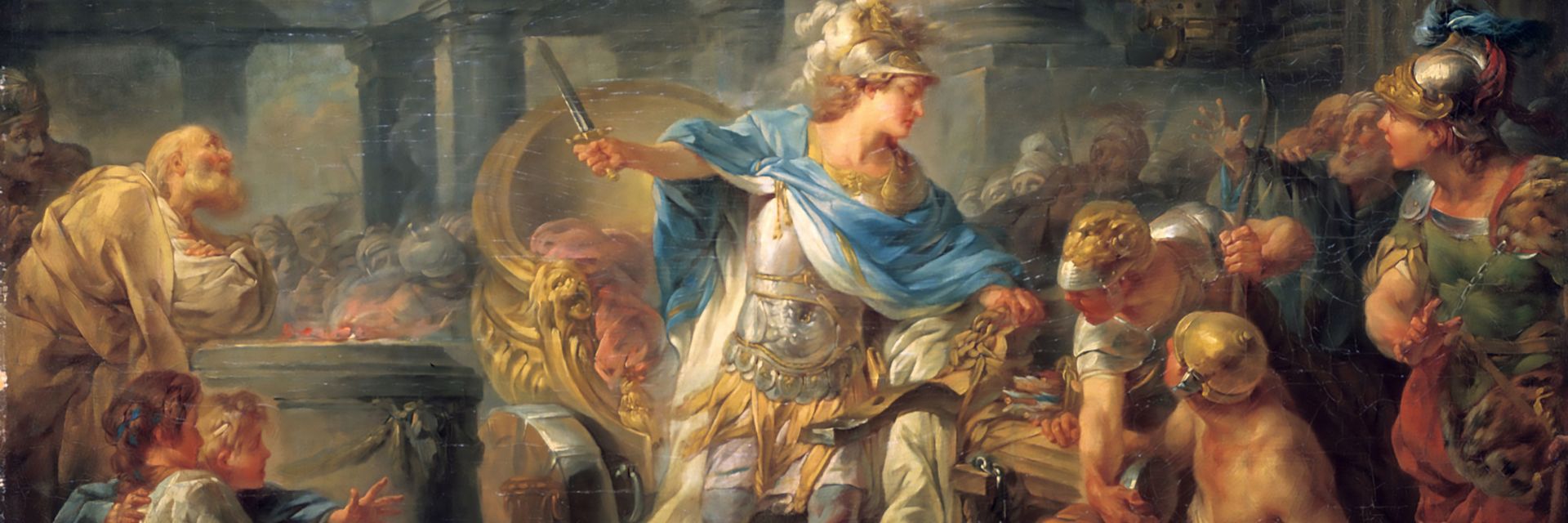The most extraordinary empire builder of his time, Alexander the Great led victorious military battles beginning at the age of 16. By his mid-20s, he had engaged Persia in a continent-spanning battle for control of the ancient world. That years-long campaign brought him to Egypt in 332 BCE, when, at 24, he was hailed as a savior by the Egyptians, who had been suffering under Persian domination. He was rewarded by being declared a pharaoh – god-man – and was inspired to lay the groundwork for the new coastal city of Alexandria.
◊
Alexander was conceived in a brilliant light . . .

Statue of Alexander in Thessaloniki
(Image courtesy of Yair Haklai, via Wikimedia)
A lightning bolt lit up the room of his mother Olympias, striking deep into her womb, warming but not harming her. She understood what had hit her; as a religious woman, she revered the gods and goddesses of the Greek Pantheon, and she knew their signs. She had been impregnated by none other than the king of the gods and all the heavens, Zeus, who was known to signify his presence with lightning bolts. Clearly Zeus had chosen her to bring his child into the world.
Olympias was pleased by this knowledge, but not unduly surprised. Her family’s history was entwined with the gods, tracing its roots to the fabled (nearly) invulnerable god-man Achilles.
But her knowledge also carried danger: Olympias knew she could never reveal to her husband Philip, ruler of Macedon, the child’s true parentage for fear of harm to the child, and she remained true to her decision. Until Philip’s death, no one knew that Alexander had been sired by Zeus – and then the only one she told was Alexander himself.
Or so goes the legend, whose roots take us back to antiquity. Part of it could be literally true: Based on what we know of Alexander the Great, the insuperable warrior who fell to no man’s sword, it seems he believed his mother’s story and saw himself as both god and man. This may be one reason for his bravery and brashness in battle, reminding witnesses of his ancestor Achilles.
Alexander Prepares for his Destiny
The historical Alexander had a rather more mundane arrival in the world. He was Alexander III of Macedon, born in 356 BCE to King Philip II and his wife Olympias. Alexander was the firstborn son of the warrior-king, who saw him as key to his plans to stabilize and extend his empire. Of course, if one parent thinks you’re a god and the other parent sees you as a future military strategist and emperor, your childhood’s going to be a little special.
Philip arranged for the boy to be tutored by none other than Aristotle himself, starting when Alexander was only 13. The great philosopher gave Alexander a rigorous and well-rounded education, preparing him for the destiny his father had chosen for him.
Aristotle introduced his young charge to the epic poetry of Homer’s Iliad. It became Alexander’s favorite literary work, and he kept a copy near him throughout his life. It’s possible Alexander considered the Iliad a sort of family history, featuring as it does the exploits of his purported ancestor Achilles.
Guided by his father and the teachings of Aristotle, Alexander began his military career at the age of 16, fighting and defeating the Thracians. Just a few years later, Philip II was dead (it was an inside job), and Alexander replaced his father as chief warrior of the kingdom and its allies. It was perhaps not a coincidence that around this time he also learned of his purportedly divine nature from his mother Olympias.

The Parthenon, Athens
(Image courtesy of Steve Swayne, via Wikimedia)
With this self-knowledge under his belt, Alexander was highly motivated to take on the Persians, whose expanding empire threatened the independence of Macedon and its ally, the League of Corinth, a loose association of Greek city-states. He launched a campaign east and then southward, along the eastern edge of the Mediterranean. Alexander was relentlessly victorious in battle, and his quest to completely overpower his adversaries was well on its way to total success.
Alexander Conquers Egypt, and Wins the Hearts and Minds of Its People
After a particularly hard-fought victory in the Persian coastal outpost of Tyre, in present-day Lebanon, Alexander and his troops arrived in the fabled land of Egypt. It was the year 332 BCE, and Egypt was a far cry from its glorious Old Kingdom days. Persia had controlled all of its territory for generations, imposing its will on the native population and thoroughly demoralizing the Egyptians by outlawing the practice of their religion. This fascinating story is highlighted in the wide-ranging documentary The Story of Egypt.
News of Alexander’s arrival in Egypt was received with great hope by the oppressed Egyptians, and he quickly became a hero to the population by so easily defeating the occupying force. By all accounts, the Persian defense collapsed virtually overnight, and Alexander quickly restored the country’s ancient traditions. As a result, the conqueror was perceived as savior of the land and its people.
3 Accomplishments of Alexander in Egypt
Alexander immersed himself in Egyptian culture and traditions, further ingratiating himself to the people. He was so popular that in a mere six months – the length of his stay in the country – he accomplished three profoundly significant goals that transformed him as much as they changed the country:
- He became a pharaoh, a god-man in the eyes of the Egyptians, and was declared a descendant of Amun, their supreme deity.
- He devised a new governing system, one that lasted three centuries.
- He conceived and even mapped out a new city, named Alexandria, on the country’s Mediterranean coast that became essential to Egypt’s trade and future development.
1 – Alexander the Great, Son of Zeus-Amun
Alexander greatly respected the religious traditions of the Egyptians, whose history had already spanned millennia. Consumed by his mother’s belief in his divine nature, he entered Egypt knowing that he wanted to affiliate himself, even identify himself, with the archaic Egyptian gods.
Make no mistake, his arrival was indeed a godsend for the Egyptian people, whose spirits were immediately lifted when the Persians’ strictures on religious observance were removed. Alexander participated in religious rituals himself. For example, making his way to Memphis, a major city on the Nile southwest of Cairo, he sought out the sanctuary of Apis, a highly regarded pharaonic deity embodied in a live bull, and offered sacrifices to it. In return, the priests of that temple proclaimed Alexander a pharaoh, bestowing on him the honorific “beloved by Amun,” Egypt’s supreme god.

Jupiter (Image courtesy of Adobe Stock)
That title fit Alexander’s self-image like a glove, and before long he had decided to make a pilgrimage to the desert west of Egypt, on the way to Libya. In the desert was an oasis that housed the Temple of Amun and its resident oracle. Alexander demanded an audience with the oracle, and was received in the temple.
Alexander never spoke directly of the content of his interview, but it is widely believed that the oracle confirmed for Alexander what his mother Olympias had planted in his heart. He was, indeed, not only beloved by Amun, he was literally Amun’s son. Since the Egyptian supreme god was, in the minds of the Greeks, aligned with Zeus, they called this god Zeus-Amun. Alexander, they believed, was his divine son.
This solidified for Alexander what he truly believed, and it was this honorific admission on the part of the Siwa oracle that caused him to be revered as “the Great” from that point forward.
2 – Replacing Persian Oppression with a More Respectful Approach
Alexander knew that defeating the Persians in Egypt meant he had to come up with a new way of governing the country. He allowed Egyptians a greater role in their government than had the Persians, but nonetheless it remained clear that Egypt was still an occupied land. Alexander appointed members of his staff, all Macedonians, to the ruling junta. And years later, after Alexander’s death in 323 BCE, Egypt was ceded to the control of his general Ptolemy. Ptolemy also integrated himself within Egypt’s cultural life, was declared a pharaoh, and his successors ruled Egypt until the suicide of Cleopatra in 30 BCE, on the verge of the country’s takeover by the Roman Empire.
Was Cleopatra Egyptian? The answer is not clear. We know that she was ethnically a Macedonian, part of the ruling class of the era in the country. However, experts suggest it is possible she possessed some non-Macedonian genetic material from other persons of noble descent from Assyria or Persia (but not Egypt or elsewhere in Africa).
3 – Founding Alexandria
Despite the fact that Alexander’s sojourn in Egypt lasted only a matter of months, his impact was vast and enduring. Over the time he spent there, he became convinced that Egypt needed a strong, cosmopolitan city to facilitate transport and trade, and to give his newly expanded empire a capital. So he toured the Mediterranean coastline of Egypt and discovered a small settlement then called Rhakotis that was perfectly suited to fulfill his dreams.
It is said that Alexander personally laid out the city, situating locations for temples to various gods as well as a large public agora, or trading space. However, Alexander did not actually preside over the construction of the city and its establishment as the center of the Hellenistic world. He left Egypt to fulfill his earthly destiny by completing his conquest of Persia, and he never returned in his lifetime.

"The Agora, Athens, Greece" by George Newenham Wright
(Image courtesy of Wikimedia)
Alexander’s aides and successors completed the monumental project, erecting such landmarks as the Lighthouse and the world-renowned Library of Alexandria, which was part of a complex devoted to the divine Muses. Both of these structures were built by Ptolemy II in the 3rd century BCE, based on the vision of his father, Ptolemy I, and, many say, Alexander himself. A remarkable documentary, Alexandria: The Greatest City, reveals this essential outpost of Hellenistic culture in all its modern charm and ancient glory.
The Legacy of the God-Man Alexander
Though his time in Egypt was brief, Alexander the Great had an outsize impact on the fabled civilization, which was perhaps where his vision of his own divinity was confirmed. He made his presence felt in all realms of Egypt’s spiritual, political, and cultural life, and his impact shaped the next 300 years of the country’s history. In addition, he moved the country’s capital to a newly established city at the mouth of the Nile Delta and restored dignity to the lives of Egyptians by removing the scourge of Persian domination.
Expelling the Persians from Egypt was not enough for Alexander. He chased his mortal enemies all the way back to what is now Kurdish Iraq and finally defeated King Darius III in the Battle of Gaugamela, in 331 BCE. Soon the Persian Empire was in his hands. Surely he felt, perhaps more than ever, what he had believed in his heart for years – that he was a divine being, made by the gods for their glory on Earth.

(Image courtesy of Wikimedia)
Alexander may even have believed that he was immortal, though he witnessed and participated in carnage all around him. While he survived the deaths of his dear companion Hephaestion and his beloved horse Bucephalus, their losses caused him deep grief. Finally, in Babylon, death came for him in the wake of a fever that lasted ten days and sent him into delirium. He was only 33 years old.
Following his death in 323 BCE, Alexander’s empire was split among his generals. Ptolemy, who inherited Egypt, was determined to obtain Alexander’s golden sarcophagus. It is rumored that he went so far as to capture the coffin on its intended route from Babylon to Macedon, then rerouted it to Alexandria where the god-man was given a temple burial befitting a dead pharaoh.
It’s impossible to understate the impact Alexander had on the ancient world. His conquests defined the Hellenistic Age and supported an expansive Greek empire that lasted until it fell to Roman forces centuries after his death. As the victors might have proclaimed: Sic transit gloria mundi – thus passes the glory of the world.
Ω
Kevin Martin is Senior Writer for MagellanTV. He writes on a wide variety of topics, including outer space, the fine arts, and modern history. He has had a long career as a journalist and communications specialist with both nonprofit and for-profit organizations. He resides in Glendale, California.
Title image: Alexander cuts the Gordian Knot, painting by Berthelemy ca. 1767. (Credit: Hohum, Public Domain, via Wikimedia Commons)



